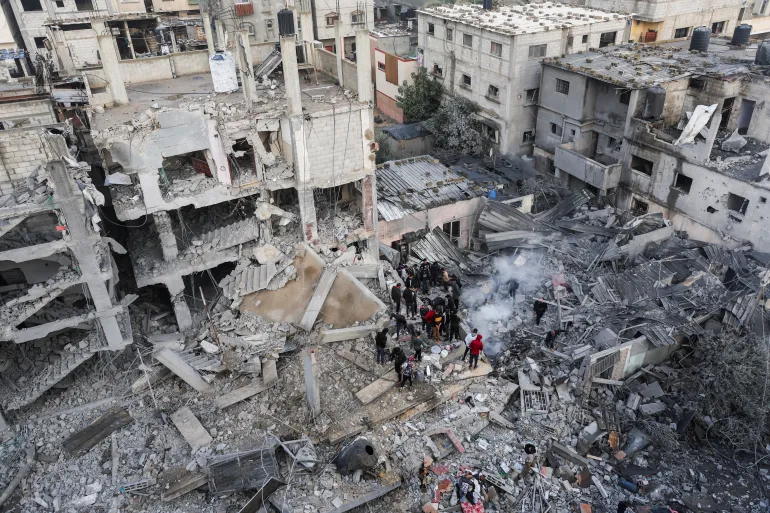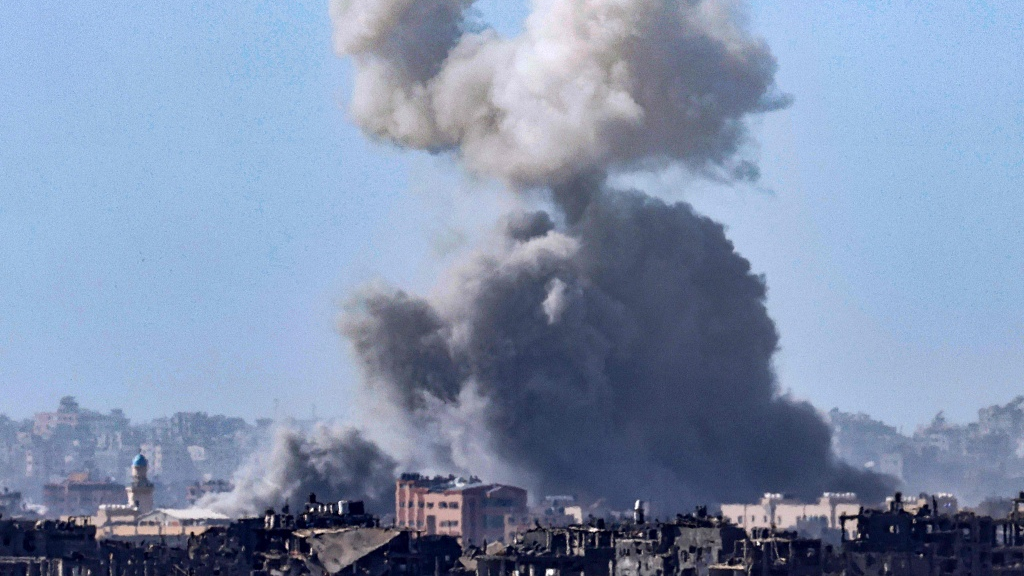
The pursuit of peace becomes a light of hope in the face of hardship, pointing the way to a better future. As the toll of deaths in Gaza keeps rising,
When it comes to the likelihood of Israeli-Palestinian peace, there are plenty of reasons to give up.
Both sides’ views have become more hardened as a result of the immense death toll and destruction caused by the Hamas massacre and Israel’s heavy military attack on the Gaza Strip. This has fueled feelings of grief, rage, and unresolved retribution.
Senior officials who were closely involved in previous attempts to break through this most unbreakable of impasses, however, have told NBC News that there might be hope and even opportunity in this tragic time.
Veteran Israeli politician and peace negotiator Yossi Beilin, whose backchannel talks resulted in the Oslo Accords, remarked, “It’s a big crisis— and crises create opportunities.” The 1990s saw some historic agreements between Israel and the Palestinians that laid out a path toward peace but ultimately fell short of expectations.
Even though Beilin is fully aware of the difficulty facing anyone hoping for a diplomatic settlement between the Israelis and Palestinians, he and others believe that one important factor has changed. The world is watching Israel and the Palestinian territories, a region of land scarcely larger than Massachusetts, to a degree not seen in decades. Furthermore, few people, regardless of their political leanings, think that the previously accepted status quo can last.
The Rise of Trump Sneakers: A Russian CEO’s $9,000 Bid
Beilin declared, “The world had given up on us.” But everything changed on October 7.
Before that day, Israel and the Palestinians were at a standstill over the matter; Israelis were afraid of rocket attacks and lone Palestinian militants. The 16-year Israeli land, air, and sea blockade of Gaza destroyed the country’s economy and dashed the dreams of its people for the future. Additionally, Palestinians in the occupied West Bank were forced to defend their territory from Israeli settlers in tense confrontations that frequently descended into violent altercations.

However, the idea of moderation and compromise had scarcely felt farther away with Israeli Prime Minister Benjamin Netanyahu forming the most far-right administration in the Jewish state’s history and Hamas, a terror organization outlawed in the United States and Europe, dominating Gaza.
“At the 2000 Camp David summit, people said that the status quo is sustainable and that the issue of Palestinian-Israeli peace can be put on indefinite hold.” This was stated by Omar Dajani, legal counsel to the Palestinian negotiating team. “Everything that has transpired since October 7 has blown all of that away, both good and bad.”
Despite how horrific the war has been, it has prompted Western policymakers to revive discussions of a “two-state solution.” It is generally acknowledged that this goal—which has been regarded as dead for at least ten years—means creating a single Palestinian state that would include East Jerusalem as its capital and encompass Gaza and the West Bank.
“A two-state solution is the only way to guarantee the long-term security of both the Israeli and the Palestinian people,” said President Joe Biden on X on November 28. in one of his now-familiar appeals for this kind of resolution. “We will not give up on working towards this,” he continued, adding that it was crucial “to make sure Israelis and Palestinians alike can live in equal measures of freedom and dignity.”

Some prominent Israeli officials have become more outspoken in their opposition to such proposals, even while the head of Israel’s most significant and closest friend supported a two-state solution as a means of assisting both Israel and the Palestinians in emerging from decades of violence. After the battle with Hamas is over, Israel’s ambassador to the UK told Sky News, NBC News’ British partner, that her nation would not recognize an independent Palestinian state.
She responded, “Absolutely no,” when questioned about the likelihood.
Netanyahu has made a statement like this
“I tore up the Oslo Accords. At a press conference on December 16, he stated, “I still think they were a terrible mistake.” “I take pride in having stopped the establishment of a Palestinian state.”
Leading those negotiations thirty years ago was crucial, according to Jan Egeland, the principal negotiator for the Oslo Accords during his time as Norway’s deputy foreign minister. In search of a way out of the impasse, the Palestine Liberation Organization—then a dangerous terrorist organization that threatened Israel by taking over aircraft—came to Norway.
.In 1992, a new Israeli administration headed by Foreign Minister Shimon Peres and Prime Minister Yitzhak Rabin took office. They started the covert negotiations that resulted in the Oslo Accords by indicating that they would be open to considering the PLO’s advances. The accords were signed under the direction of then-President Bill Clinton, and the United States dedicated time and funds to carrying out the peace process.
According to Egeland, “The issue now is that neither side has nearly the same leadership as they did back then.” He refers to the coalition that rules Israel as having “the most extremist government in Israel’s history.” It is full of racists and extremists.
Samsung Galaxy S24 Ultra vs. iPhone 15 Pro Max: A Battle of Flagship Smartphones
He said, “These are people who have no place in any government in any civilized country.”
However, he referred to decades of missile assaults and suicide bombings against Israeli civilian targets when he stated, “Hamas has the killings of the seventh of October on their conscience and so many other things.”
Netanyahu won’t be at the table, in my opinion. Egeland remarked, “I don’t think Hamas will be at the table.”
He stated that any effort to start a peace process “will depend on the international community,” which is led by the United States, the European Union, and the Arab countries.
In the words of Egeland, “The United States has been sitting on the fence for so many years without taking the leadership role that they should.” “They need to leave the fence and start a genuine peace process, just like the United States did in the 1990s.”

For the time being, the Biden White House is facing a lot of criticism from pro-Palestinian quarters for utilizing audacious language while continuing to provide Israel with over $3 billion annually in arms and ammunition as well as diplomatic backing.
According to Egeland, the reason the accords in Oslo did not result in peace was because there was more opposition to the process. He declared, “The enemies to peace were so strong,” referring to radicals on both sides of the debate, such as the far-right Israeli who killed Rabin in 1995 because of his involvement in the negotiations.
Samsung Galaxy Ring Support on All Android Phones, But Not iPhone
Local opinion is becoming more and more divided these days.
Numerous surveys indicate that a majority of Jewish Israelis favor the war, with 87% of them agreeing with the most recent survey conducted earlier this month by the Israel Democracy Institute think tank. Furthermore, even those grieving Palestinian losses have told NBC News journalists who have spoken with hundreds of Israelis since the war started that defanging or eliminating Hamas is crucial for their security. That Hamas attack resulted in almost 1,200 deaths and nearly 240 kidnappings. Since then, the Israeli bombardment and invasion have killed around 22,000 Palestinians, according to local health authorities who have the support of U.S. and UN officials.
Meanwhile, the majority of Palestinians backed Hamas’ October 7 attack, according to a poll carried out in the West Bank and Gaza during the seven-day truce in November and published on December 13 by the Palestinian Centre for Policy and Survey Research, a reputable polling organization with its headquarters in the West Bank city of Ramallah. A little more than 72% of Palestinians think that considering the Israeli reaction, Hamas’ attack was “correct.” In-person interviews were conducted with 1,231 participants in the poll in the Gaza Strip and the occupied West Bank.
Veteran Palestinian lawmaker Hanan Ashrawi stated last month in an interview with NBC News that many Palestinians “feel that the prisoner gave back to the Israelis what the Israelis have been giving to them.” About what she and other pro-Palestinian voices perceive to be decades of mistreatment by Israel, enabled by its international backers, she said, “I personally although I oppose any acts of violence against civilians, I also think that the world has completely ignored the suffering that the Palestinian people have endured.”
Ashrawi said, “The victim needs to lie down and die quietly, or else they will be labeled a terrorist.”
In the West Bank, support for Hamas has tripled, while in Gaza, it has marginally increased. Even said, the majority of Palestinians continue to disapprove of Hamas as a political organization. Support for Hamas is 42% in Gaza, which is ruled by the group; this is a tiny increase from 38% three months earlier. Within the poll’s margin of error, support for a two-state solution has increased marginally from 32% before the war to 34%.
Many Palestinians NBC News spoke with expressed doubts about Israel’s stated war objectives, which include overthrowing Hamas and rescuing the prisoners, believing that the conflict is a pretext to ethnically exterminate Palestinians from Gaza. This is a legitimate danger, as driving out Palestinians from their land has long been an extreme viewpoint in Israel that has received greater mainstream recognition as a result of the conflict.
While some, like Beilin, believe that a two-state solution may not be achievable, others do not share these hardened views.
“It is advised not to read polls during a war; people are full of hate,” he said, adding that “there will be huge majorities to support Israeli and Palestinian leaders.”
One possible path to peace has been outlined by Beilin, Dajani, and other Israeli and Palestinian officials who have been interviewed by NBC News over the past two months. These include overthrowing Hamas, handing Gaza over to an international coalition, possibly headed by neighboring Arab powers, rebuilding Gaza’s infrastructure and democracy, and having the Palestinian Authority lead a unified Palestinian state that includes both Gaza and the West Bank.
In a late-October interview with NBC News, former Israeli Prime Minister Ehud Barak stated that the plan is “worth considering.” “I can’t guarantee that it will work. It depends on what each player believes. However, it merits investigation,” he remarked.
Many questions remain unanswered, including how to assure Israelis and Palestinians that they are safe, what to do about Israeli settlements in the West Bank that are illegal according to international law, how to allow the Palestinian Authority to govern Gaza while it hardly has control over the West Bank, and how to resolve Jerusalem’s millennium-old dilemma as a city dotted with holy sites and sources of conflict for Christians, Muslims, and Jews.
“Hope has a place, as long as we remember that optimism and hope are two different things,” Dajani said.
According to Egeland, terror rather than hope is what could compel the international community to take action. The international community, he claims, has been persuaded that “the occupation cannot continue like this, the siege cannot continue as it has been, the warfare cannot continue” as a result of the horrors of October 7 and the “bloodletting” that ensued in Gaza.
“In this crossroads of civilizations, which is Israel and Palestine, I don’t think the world will let the Israelis and Palestinians kill each other every second year forever,” said the politician.
